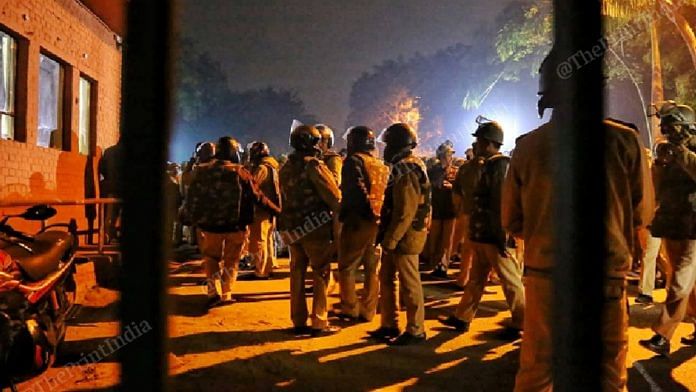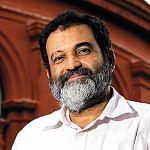The Opinion Makers
 How to reduce NRC’s administrative burdens
How to reduce NRC’s administrative burdens
Srinivas Yerramsetti | Researcher of public administration and policy
The Hindu
Yerramsetti argues that Prime Minister Narendra Modi’s challenges, after the backlash against the National Register of Citizens and the Citizenship Amendment Act, are “two-pronged”. First, to address the law’s exclusionary nature and second to “reduce public resentment against the IT-driven bureaucracy that, instead of reorganising internal processes to utilise previously submitted citizen data to the government effectively… [will] ask the entire Indian population to resubmit documents to prove their citizenship”.
 India’s police force is under stress
India’s police force is under stress
Yashovardhan Azad | Former IPS officer and Central Information Commissioner
Hindustan Times
Azad highlights four challenges before the Indian police in 2020 with CAA protests. One, CAA agitations are distinct from usual localised ones; two, they are in the glare ofTV channels and reporters thronging the area of protests; three, police are not stationed at designated protest venues and four, rabble-rousing from CAA protesters is adding fuel to fire.
Arvind Panagariya | Professor of Economics at Columbia University
The Times of India
“Rapid urbanisation is a key feature of economies that have sustained 8-10 per cent growth for two to three decades,” writes Panagariya. In comparison, India has experienced urbanisation at a “snail’s pace” and to increase pace, an essential element is economic transformation.
Naushad Forbes | Co-Chairman of Forbes Mashall, post president CII, chairman of Centre for Technology Innovation and Economic Research and Ananta Aspen Centre
The Indian Express
Forbes points out five shortcomings in Saturday’s Union Budet. First, the seriousness of the slowdown was not addressed directly; two, it should have focused on immediate measures to stimulate economy; three, it indicates increasing protectionism; four, a large part of revenue is dependent on the proposed disinvestments and five, there should be an institutional infrastructure to tackle our complex economy not just politicians and bureaucrats.
H.G.S. Dhaliwal | IGP, Arunachal Pradesh
The Indian Express
“The chasm between people’s perception of justice and the actual majesty of law as it unravels over trial, conviction and execution has been widening with each passing day of long-drawn trials and eventual implementation of the verdict,” writes Dhaliwal. He argues that in light of this outrage, perhaps, it is time for the State to consider making common people participants in justice dispersal through the jury trial system.
 Modi’s approach to economics doesn’t tick any of the old boxes
Modi’s approach to economics doesn’t tick any of the old boxes
R. Jaganathan | Editorial director ‘Swarajya’ magazine
Mint
Jaganathan observes how ‘Modieconomics’ is very much shaped by the “PM’s persona” which manifests as fiscal conservatism “counterbalanced by a predilection for bold and dramatic gambits”. “On the trade front, Modi has over the last two years gone swadeshi”, he writes. Modi’s opportunistic “pragmatism unhindered by economic ideology” leads Jaganathan to expect “conservative budgets, with big gambles outside them” as a future trend.
 Seven key reasons for RBI to not shift it’s policy stance
Seven key reasons for RBI to not shift it’s policy stance
Kaushik Das | Chief economist, India, Deutsche Bank
Mint
Das argues that it would be “premature” for the RBI to shift to a neutral monetary policy in the face of high inflation. “The April policy would be an appropriate time for the Monetary Policy Committee (MPC) to consider whether to change its stance or not, based on the evolving growth-inflation trend till then,” he writes.
TV Mohandas Pai | Chairman, Aarin Capital
Siddhartha Pai | Founding partner, 3one4 Capital
The Financial Express

The authors criticise FM Sitharaman for treating Indian start-ups like “stepchildren” to listed companies, and promising them changes that don’t materialise. They explain that “fair market value”, which was the bane of ‘angel tax’ and IMB’s “parsimonious” certification process are at the core of the ESOP taxation issue when it comes to startups.
Ashoka Hinduja | Chairman, Hinduja Group of Companies (India)
The Hindu Business Line
Hinduja credits FM Sitharaman for addressing as many concerns as possible in her Budget “at the time when almost every sector was screaming for help and support” and fiscal constraints were looming. He urges further reforms in the manufacturing sector so that India can become “the factory for the world”, especially since ‘Make in India’ failed to make as much progress as schemes like “swachh bharat” and “beti padhao”.
 Coronavirus puts Beijing model to the test
Coronavirus puts Beijing model to the test
Jean-Joseph Boillot | Economist, French Institute of International Relations
Business Standard
Boillot discusses China’s stringent management of the coronavirus epidemic in terms of the “authoritarian developmental state model”. The crisis also highlights “deglobalisation and economic relocation, that is to say, the re-embedding of the economic into the social and territorial fabric”, he explains.
Comparing the downfall of the “Beijing consensus” along with the “Washington consensus”, Boillot predicts the world must now turn to “a third, more sustainable paradigm between the all-market and all-state”.
Today’s Editorials
The Indian Express: As PM Modi breaks his silence on Shaheen Bagh, it is clear that the BJP’s vilifying campaigns and inflammatory speeches in the Delhi polls is sanctioned and encouraged by the top leadership, Express says in ‘The protest test’. The systematic demonization of the protest raises questions on the government’s willingness and ability to talk to its own people without calling them names, it notes.
The Hindu: In ‘Punish the police’, Hindu condemns the action taken by the police against a private school in Bidar for performing an allegedly seditious play against the Citizenship Amendment Act and calls it a misuse of “the sedition provision in penal law”. Hindu suggests that it is time to strengthen rules to provide for exemplary punishment to police personnel who violate constitutional guarantees of free speech and personal liberty.
Hindustan Times: With three confirmed cases of coronavirus outbreak in Kerala, the state’s primary health care system has constantly upgraded itself. In ‘Coronavirus: other states can learn from Kerala’, HT writes that the preventive measures being taken by the state such as constant monitoring, isolation and private sector partnership are laudable and other states should learn from this example.








